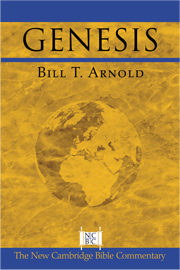Book contents
- Frontmatter
- Contents
- List of Supplementary Sections
- Preface
- A Word about Citations
- Abbreviations
- I INTRODUCTION
- II SUGGESTED READINGS ON GENESIS
- III COMMENTARY PART ONE: THE PRIMEVAL HISTORY – GENESIS 1–11
- IV COMMENTARY PART TWO: ANCESTRAL NARRATIVES – GENESIS 12–50
- Scripture Index
- Extrabiblical Texts Index
- Author Index
- Subject Index
- References
I - INTRODUCTION
Published online by Cambridge University Press: 05 June 2014
- Frontmatter
- Contents
- List of Supplementary Sections
- Preface
- A Word about Citations
- Abbreviations
- I INTRODUCTION
- II SUGGESTED READINGS ON GENESIS
- III COMMENTARY PART ONE: THE PRIMEVAL HISTORY – GENESIS 1–11
- IV COMMENTARY PART TWO: ANCESTRAL NARRATIVES – GENESIS 12–50
- Scripture Index
- Extrabiblical Texts Index
- Author Index
- Subject Index
- References
Summary
The book of Genesis addresses the most profound questions of life. Who are we? Why are we here? And, more to the focus of Genesis, who is God, how does God relate to the universe, and what are the origins of God's chosen people, Israel? Many cultures, ancient and modern, have produced similar philosophical speculations about the nature of God, humanity, and cosmic origins, but none has left the impact on world history and thought as enduring as that of Genesis.
The book is comprised of two large blocks of material, the Primeval History (Gen 1–11) and the ancestral narratives (Gen 12–50). These have been linked together in order to express a certain theological perspective, intended to establish the background necessary for reading the rest of the Pentateuch and beyond. Essential to that perspective in Genesis is the careful identification of the national God of ancient Israel, Yahweh, with the Sovereign God of creation as well as the self-revealing, promise-giving, and covenant-making God of Israel's ancestors. The God encountered in Genesis is therefore also the God of the plagues, the exodus from Egypt, the covenant, the law, the monarchy, the prophets, and the exile and restoration. Genesis is preparatory to a larger story.
This commentary will hold two commitments in focus related to methodology. (Unless the reader is especially interested in questions of method or composition, it may be advisable to skip the rest of this introduction and move directly to the commentary itself.
- Type
- Chapter
- Information
- Genesis , pp. 1 - 19Publisher: Cambridge University PressPrint publication year: 2008



